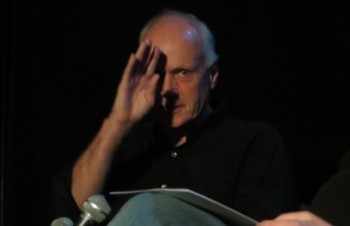Well-known for being intellectual and deep, in other words obscure.
—Globe and Mail
Always a must-read.
—Two Lines Press
Holy shit! This looks great! Even the fine print (I always read credits at movies too).
—a reader
I think it looks spectacular! Numéro Cinq is one handsome webzine…
—a reader
Must read with coffee & rejoice that NC continually makes neurons fire and leaves readers a little smarter than before.
—another reader
…yesterday was the first time I looked at N.Cinq in a while, not because it isn’t great which it is but because it makes my ambition stand up and scream and on days when I have so much else to do (most days now that it’s summer) this is like eating something really good in small spoonfuls, some sugar, some fire, mostly fire.
— yet another reader
Well, I live by myself on a rock in the middle of the woods, so you’ve elevated the level of discourse for one person, anyway. I don’t even have a dog to converse with any more.
— even again another reader
Humanity is being preserved at NC, along with literature. (Just saw Court’s piece.)
—a reader
Very cool place. Easy-going but chewy, dense stuff. Perfect mix I think. I’m apt to hang out a bit more often. I just wish it served drinks….
—a reader!!!!
I love how it carries a conversation in a dark house, voices popping up from various corners, passing thought threads here and there. And I love how it carries back through you, too. Like some strange heartbeat that you pulse out, but returns to give you something in response.
— incredible as it seems, another reader
Numéro Cinq started January 11, 2010, as…
a reading, discussion and resource site for a small group of Douglas Glover‘s friends and writing students. It morphed into something monstrous, tenticulate, multiform and quite possibly (gasp) alive!
In its 7 1/2 years as a going concern, the magazine published a stellar array of new and known (international, award-winning) writers including among others, from Canada, Jowita Bydlowska, Lynn Coady, Leon Rooke, Diane Schoemperlen, Mavis Gallant, Julie Trimingham, Bill Gaston, Sheila Heti, Mark Anthony Jarman, Caroline Adderson, Amanda Jernigan, Ann Ireland, David Helwig, Phil Hall, Cynthia Flood, Catherine Greenwood, Julie Bruck, Sharon McCartney, Steven Heighton, and Jack Hodgins; from the U.S., Rikki Ducornet, Curtis White, Lance Olsen, Lydia Davis, Noy Holland, Greg Mulcahy, Madison Smartt Bell, Victoria Redel, Micheline Aharonian Marcom, Joseph McElroy, Donald Hall, David Ferry, Steve Almond, Mary Ruefle, Keith Lee Morris, Darin Strauss, David Shields, Robert Wrigley. Anthony Doerr, Brad Watson, Bianca Stone, Robert Wrigley, Rigoberto Gonzalez, Dawn Raffel, and Lynne Tillman; from Ireland and the UK, Gabriel Josipovici, George Szirtes, Andrew Gallix, Kevin Barry, Julie Reverb, John MacKenna, Nuala Ní Chonchúir, John Kelly, Doireann Ni Griofa; plus work in translation by Viktor Shkolvsky, Mauricio Segura, Daniil Kharms, Julián Herbert, Mircea Cărtărescu, Álvaro Pombo, Quim Monzó, Juan José Saer, Anton Chekhov, Mihail Sebastian, Giacomo Leopardi, Habib Tengour, Besik Kharanauli, Rilke, Mathias Énard and many others. We’ve published novellas, entire books, plays, poems, translations, fiction, nonfiction, sermons, criticism, memoirs, music, art work, hybrid art, conceptual art, provocative graphics.
And this is not to forget our intrepid band of NC staffers, contributors and contributing editors, all convicted felons of the literary type, dedicated artists fast making a name for themselves in the brash new digital universe.
The Name
The name for the magazine came from DG’s short story “The Obituary Writer” in which story the hero, based loosely on the author as a young newspaperman, harasses a distraught neighbour who lives in the apartment across the hall by making loud noises in the night and pretending to be a member of a sinister terrorist group called Numéro Cinq.
Sgt. Pye evicts Earl Delamare. It’s my fault, too, because I was taunting Earl, playing on his fantasies. It’s possible I have driven him mad. One night he came to my door, first listening, then mumbling, then beginning his litany of wild accusations. Instead of responding with my usual silence, I put Night on Bald Mountain on the stereo. As the music rose, I began to intone the French advertisements on the backs of cereal boxes in my kitchen cupboard.
The music gave Earl fits; he practically howled with rage. “Numéro Cinq! Numéro Cinq!” he cried. I played John Cage on the stereo and read the cereal boxes backwards, imitating several voices at once. Earl began to beat the door with his fists, perhaps even his head. I could see the panels giving with the force of his blows. In the midst of this I heard Sgt. Pye climbing the stairs. When he came into my apartment, he found me sitting in an old Morris chair, eating a bowl of Rice Krispies, with the stereo low. Earl had retreated to his room like a mole going underground. But I could still hear him shouting. “Numéro Cinq! Numéro Cinq!” When Sgt. Pye let himself into Earl’s room, the black man went through the window and down the fire escape.
After Earl is evicted, the hero slips into his abandoned room and discovers a photograph of a young woman. Later, he finds Earl living at a shelter while he awaits a decision on whether or not he will be committed to a mental hospital. The hero buys Earl a beer and the two walk through town at which point, for no particular reason, he starts to needle Earl again.
When we finish the beer, I take a deep breath and hand him the photograph. It turns out, as I had begun to expect it would, to be a photograph of his dead wife, a woman he loved deeply but who betrayed him with another man. I tell him I am researching a newspaper story about a secret terror organization called the Numéro Cinq, that I’d appreciate him telling me anything he knows about it. Earl is silent, but tears come to his eyes. I say, “I don’t know much. I’ve been tracking them for years.” Earl nods vigorously. “But they’re everywhere,” I say. Earl hides his face in his hands. “Everywhere,” I say, “and we’re doomed.”
–from “The Obituary Writer” in A Guide to Animal Behaviour; also in Bad News of the Heart.
Douglas Glover’s…
 obscurity is legendary; he is mostly known for being unknown. He has been called “the most eminent unknown Canadian writer alive” (Maclean’s Magazine, The National Post). But for sheer over-the-top hyperbole, nothing beats the opening of a recent piece about him in Quill and Quire in Toronto, which elevates his lack of celebrity to the epic: “Certain mysteries abide in this world: the Gordian Knot, the Holy Trinity, and the literary obscurity of Douglas Glover.” Luckily, he owns a dog and is not completely alone in the world. And occasionally someone actually reads what he writes: He has also been called “a master of narrative structure” (Wall Street Journal) and “the mad genius of Can Lit” (Globe and Mail) whose stories are “as radiant and stirring as anything available in contemporary literature” (Los Angeles Review of Books) and whose work “demands comparison to [Cormac] McCarthy, Barry Hannah, Donald Barthelme, William Faulkner” (Music & Literature). A new story collection, Savage Love, came out in 2013.
obscurity is legendary; he is mostly known for being unknown. He has been called “the most eminent unknown Canadian writer alive” (Maclean’s Magazine, The National Post). But for sheer over-the-top hyperbole, nothing beats the opening of a recent piece about him in Quill and Quire in Toronto, which elevates his lack of celebrity to the epic: “Certain mysteries abide in this world: the Gordian Knot, the Holy Trinity, and the literary obscurity of Douglas Glover.” Luckily, he owns a dog and is not completely alone in the world. And occasionally someone actually reads what he writes: He has also been called “a master of narrative structure” (Wall Street Journal) and “the mad genius of Can Lit” (Globe and Mail) whose stories are “as radiant and stirring as anything available in contemporary literature” (Los Angeles Review of Books) and whose work “demands comparison to [Cormac] McCarthy, Barry Hannah, Donald Barthelme, William Faulkner” (Music & Literature). A new story collection, Savage Love, came out in 2013.
Glover is the author of five story collections, four novels, three books of essays, Notes Home from a Prodigal Son, Attack of the Copula Spiders, and The Erotics of Restraint, and The Enamoured Knight, a book about Don Quixote and novel form. His novel Elle won the 2003 Governor-General’s Award for Fiction, was a finalist for the IMPAC Dublin Literary Award, and was optioned by Isuma Igloolik Productions, makers of Atanarjuat, The Fast Runner. His story book A Guide to Animal Behaviour was a finalist for the 1991 Governor-General’s Award. His stories have been frequently anthologized, notably in The Best American Short Stories, Best Canadian Stories, and The New Oxford Book of Canadian Stories. He was the subject of a TV documentary in a series called The Writing Life and a collection of critical essays, The Art of Desire, The Fiction of Douglas Glover, edited by Bruce Stone.
Glover has taught at several institutions of high learning but mostly wishes he hadn’t. For two years he produced and hosted The Book Show, a weekly half-hour literary interview program which originated at WAMC in Albany and was syndicated on various public radio stations and around the world on Voice of America and the Armed Forces Network. He edited the annual Best Canadian Stories from 1996 to 2006. He has two sons, Jacob and Jonah, who will doubtless turn out better than he did.
See also “Making Friends with a Stranger: Albert Camus’s L’Étranger,” an essay in CNQ:Canadian Notes & Queries; “Consciousness & Masturbation: A Note on Witold Gombrowicz’s Onanomaniacal Novel Cosmos,” an essay in 3:AM Magazine; “Pedro the Uncanny: A Note on Juan Rulfo’s Pedro Páramo,” an essay in Biblioasis International Translation Series Online; “A Scrupulous Fidelity: Thomas Bernhard’s The Loser,” an essay in The Brooklyn Rail; “Mappa Mundi: The Structure of Western Thought,” an essay on the history of ideas also in The Brooklyn Rail; and a dozen extremely wise epigrams at Global Brief.
‘
/
Visitors, readers, and members of the public…
are welcome and encouraged to comment on these pages. It’s a friendly place, easy to work your way into. All you have to do is hit the comment button at the top of the post and join the cause. Respect the fact that the words herein belong to the people who wrote them.
/
/

